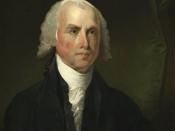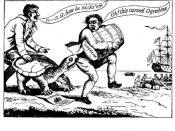While the generalization of Republican's as strict constructionists and the Federalist's as loose ones holds some truth to it, the beginning of the nineteenth century saw to a change in the economy, constitutional interpretation and judicial decisions of both parties. From 1801 until 1817 the Jeffersonian Republicans slowly converged with Federalist ideals and the Federalist's, over the course of Madison's presidency, became more and more strict as constructionists.
The Embargo Act of 1807 (Doc. C) was passed by Thomas Jefferson and although it was not strictly enforced and was widely evaded it still managed to cause a sort of depression throughout the nation. The thing is, Jefferson seemed to pride himself on his "strict constructionist" values - he played everything by the Constitution. However, did the Constitution give him the right to stop ships from going to foreign ports? It did not say specifically that trading with foreign ports will ruin our country and it should not be allowed, Jefferson just assumed that it was for the better of the country.
Jefferson also shows discrepancies for the Constitution with the Louisiana Purchase in 1803 - and that's not even halfway through his presidency! Of course it's considered the best real estate deal of all time but it still rebels against Jefferson's strict constructionist self. He actually sent two men to negotiate the purchase and without the government's consent, they bought it - the Constitution definitely did not give him that right.
When it comes to views on the Constitution, according to the characterization of Republicans, they're supposed to believe in following what is stated directly in the document and nothing else - no loose interpretations, no changes, nothing. However, if Jefferson was such a strict constructionist, as he claimed, how did he find the power for the Louisiana Purchase? The...


